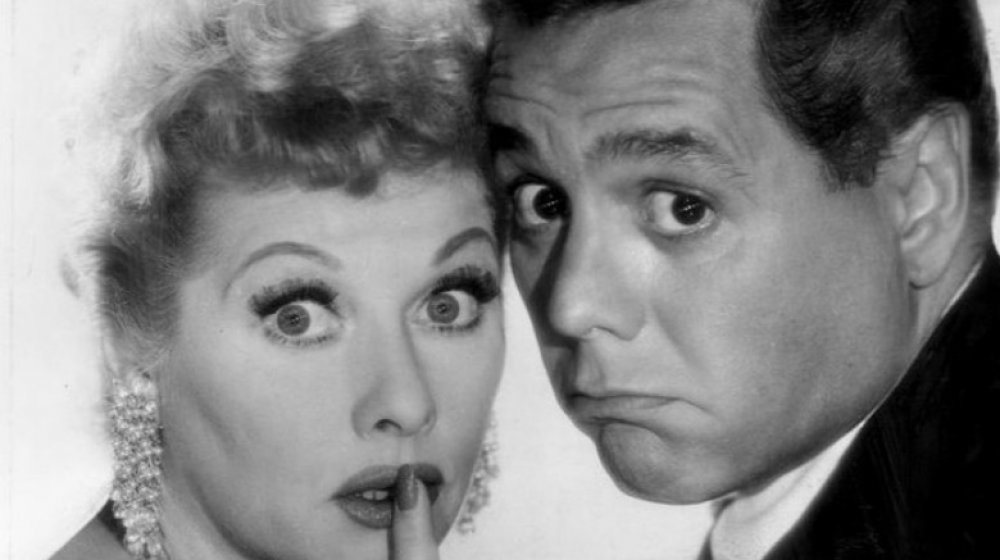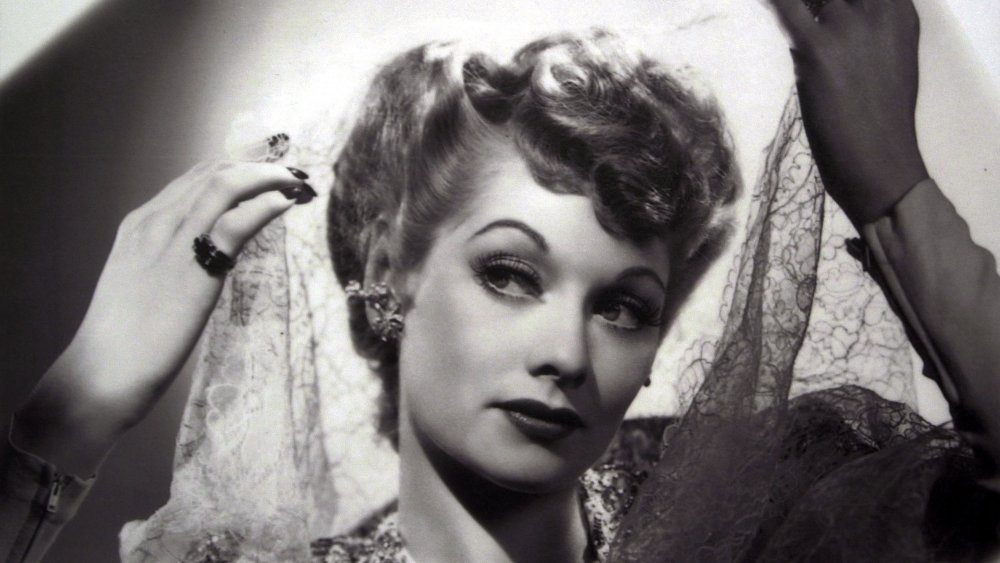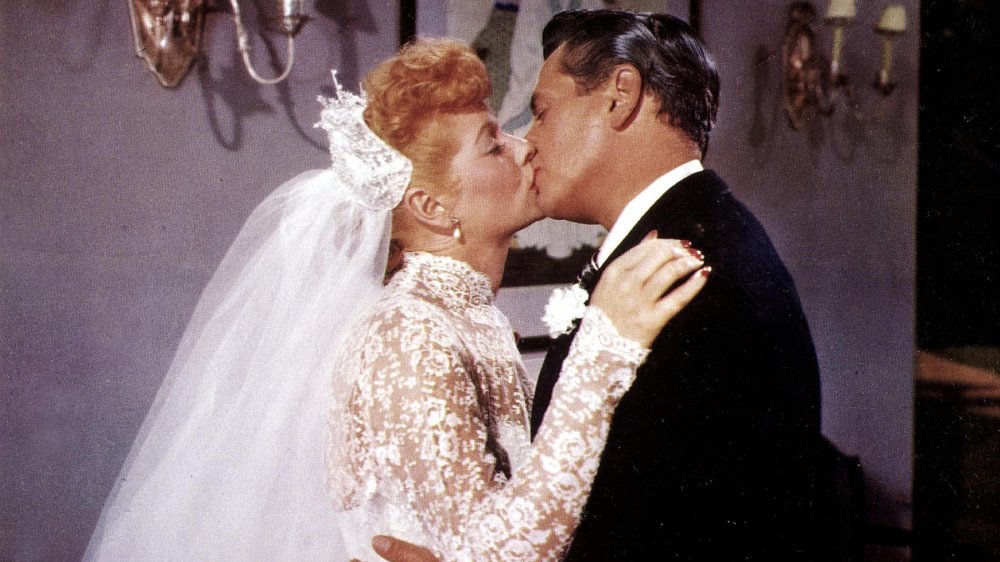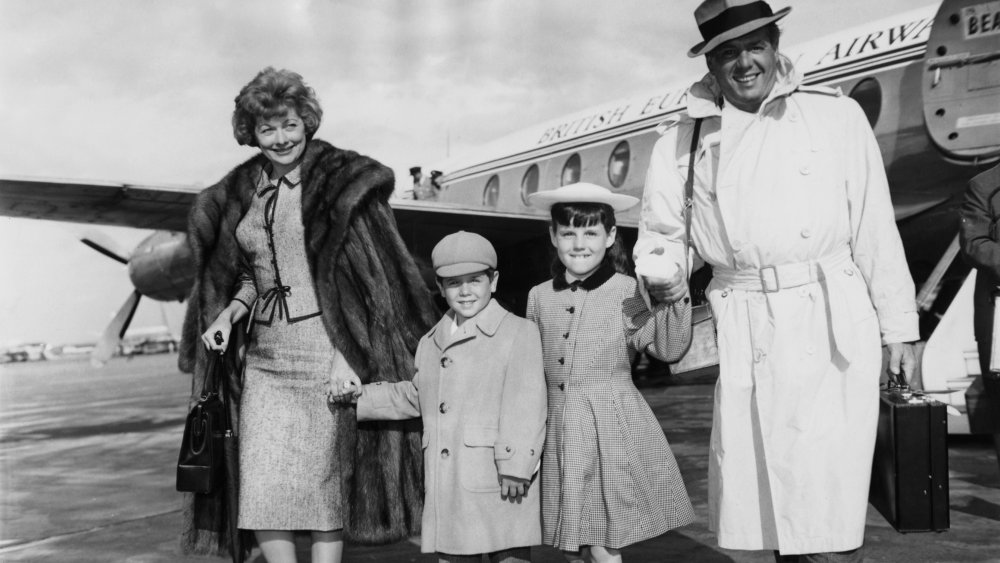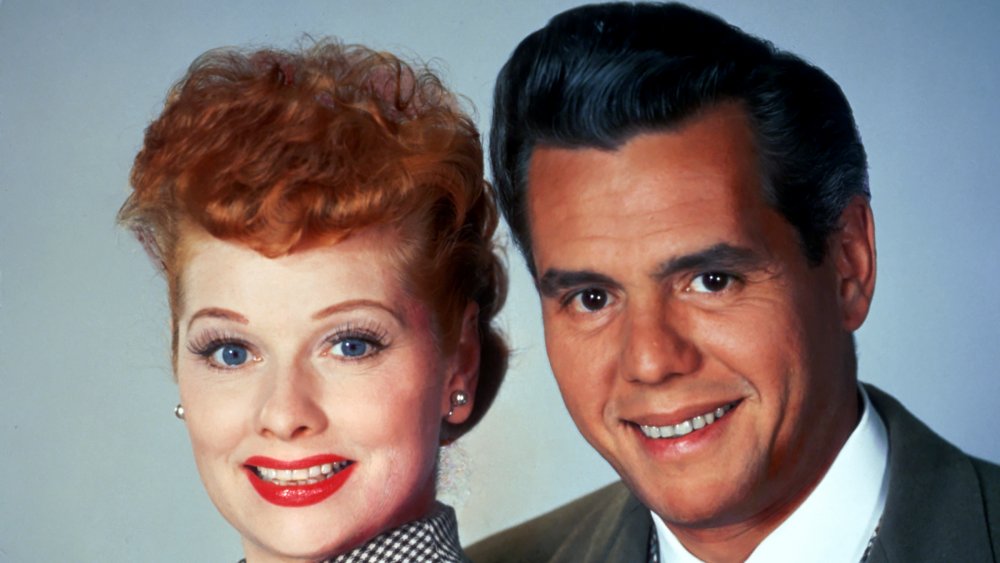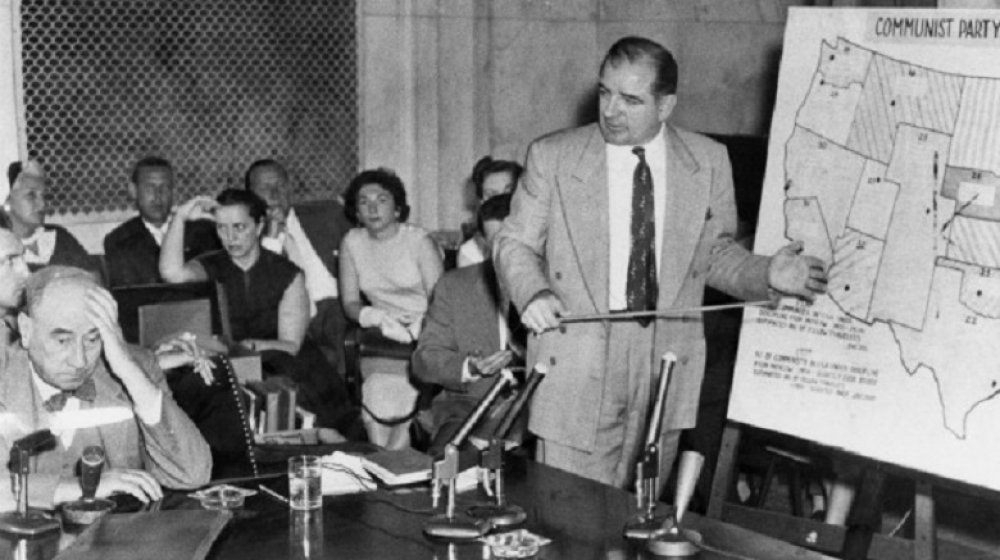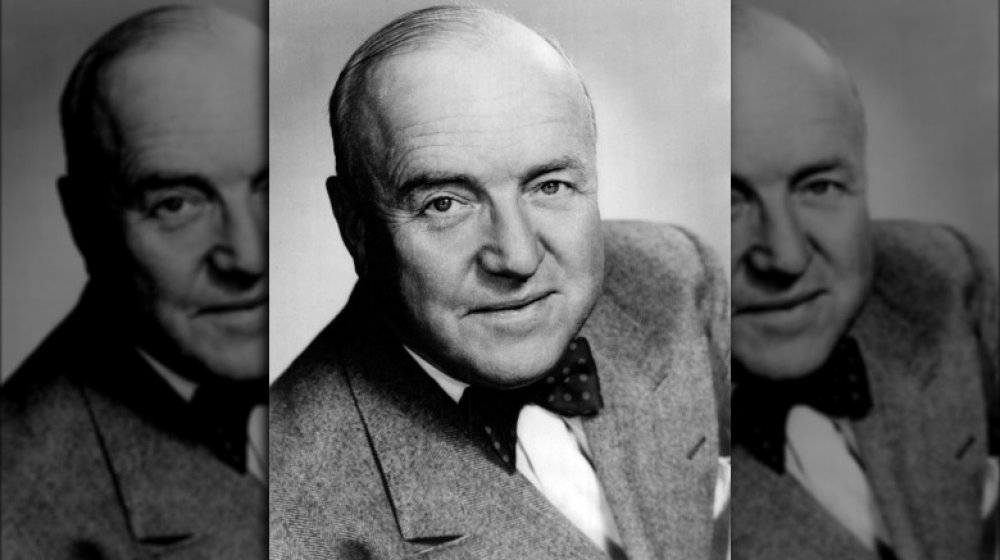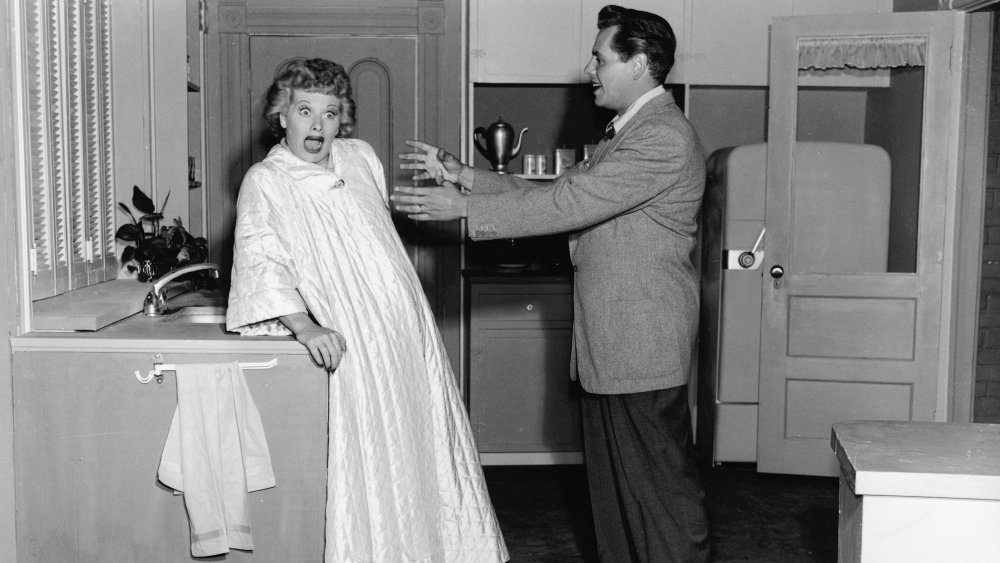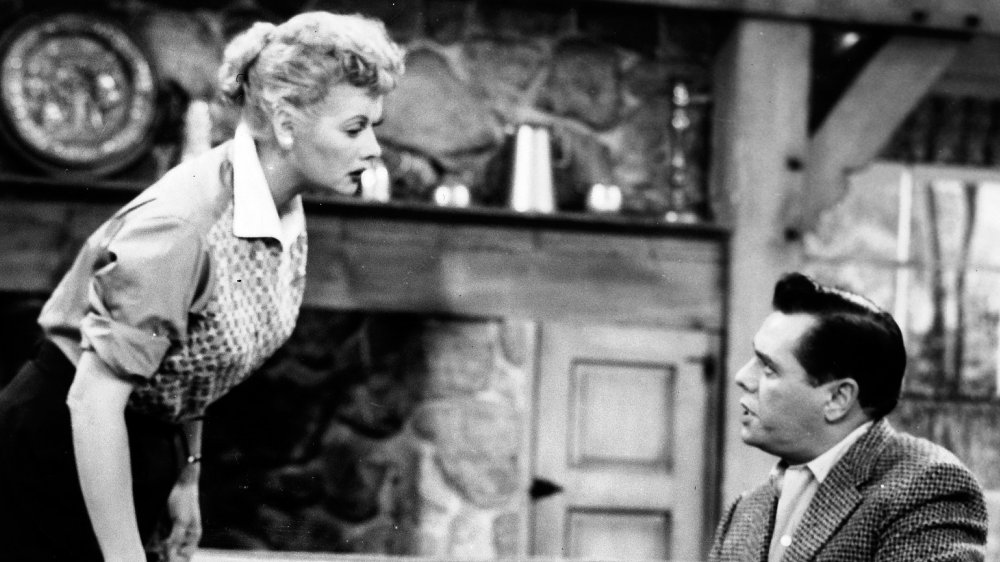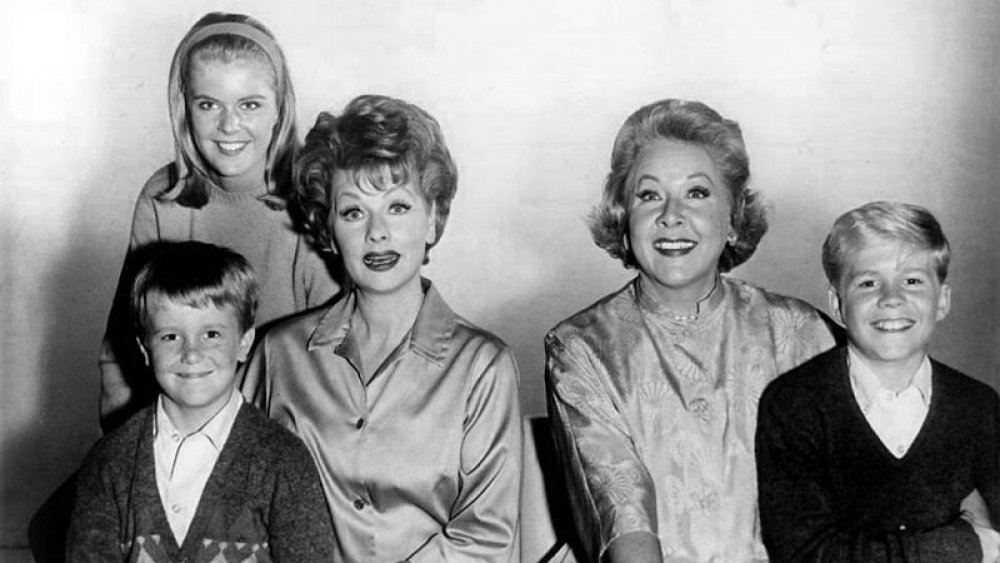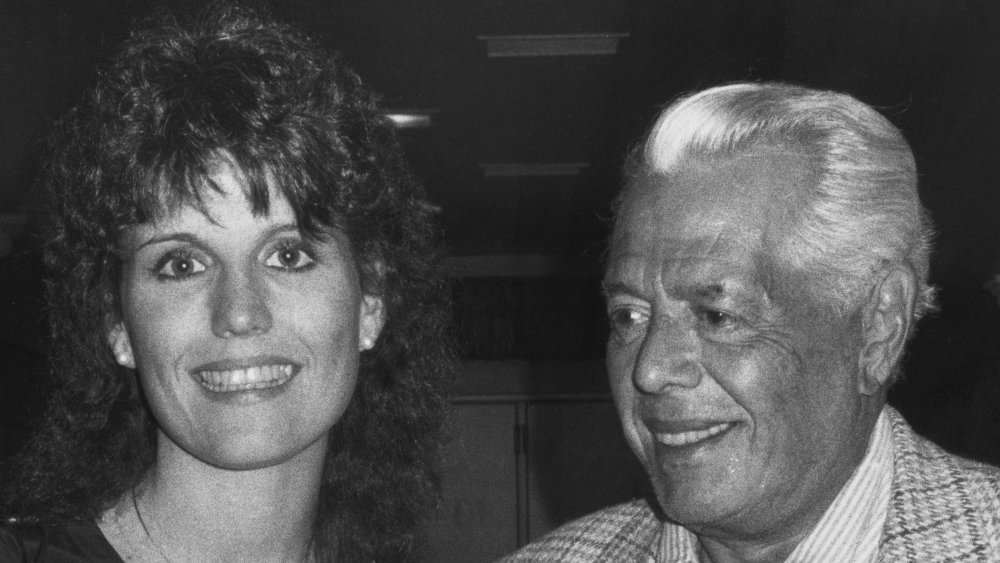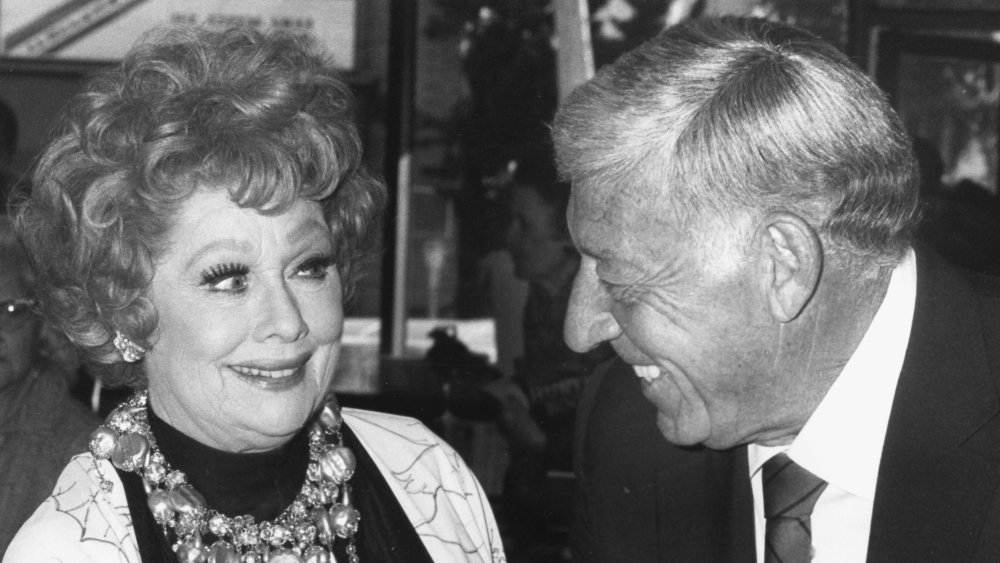Tragic Details About The I Love Lucy Cast
I Love Lucy is one of the most enduring and best-loved television shows in history. Everybody loves her and has since 1951, when the show first aired. For six glorious years, according to Britannica, Lucy and Ricky Ricardo, Fred and Ethel Mertz, Little Ricky and a host of other side characters gave new life to situation comedies of the era. The show scored five Emmy Awards during its time on the air and generated such popularity that I Love Lucy clothing, comic books, jewelry, knick-knacks, and paper dolls became all the rage.
I Love Lucy has some notable achievements: The show was the first to be rerun on television after going off the air in 1957. It was likely the first show to feature numerous spin-offs: the Lucy-Desi Comedy Hour from 1957 to 1960, The Lucy Show from 1962 to 1968, Here's Lucy from 1968 to 1974, and Life With Lucy in 1986. And, according to the Library of Congress, I Love Lucy can still be seen in 80 countries worldwide, in 22 languages. As one might guess, however, the fame of star Lucille Ball, husband Desi Arnaz, and the couple's television family came at a cost. Here are some notable notes about the I Love Lucy show and its endearing stars.
Lucille Ball began as a Queen of the B's
Movies, that is. Born in 1911 near Jamestown, New York, Lucille Desiree Ball was a restless teenager who yearned for fame. History reveals that at the age of 15 years, Ball began traveling to New York City and trying out for acting roles. In the book Ball of Fire: The Tumultuous Life and Comic Art of Lucille Ball, author Stefan Kanfer says that the teen soon realized she had no professional talent. But she kept trying and even took on a stage name, Diane Belmont, for a time. Meanwhile, she worked odd jobs while seeking work on the stage.
Ball would later tell People that after six months, it dawned on her that producers like Eddie Cantor and Sam Goldwyn "found that a lot of the really beautiful girls didn't want to do some of the things I did," namely physical comedy. "I didn't mind getting messed up," she explained. At last, she was hired in 1933 as the Chesterfield Cigarette Girl and went back to using her real name. For the next three years, according to Internet Movie Database, Ball appeared in an amazing 39 films — mostly uncredited — before finally landing a role as Kitty Collins in Follow the Fleet, starring Fred Astaire and Ginger Rogers. A slew of "B" movies (low-budget films, often used preceding the main film in a double feature) followed. "I was the queen of the B-pluses," Ball joked.
Desi Arnaz, the unfaithful playboy
By 1940, Lucille Ball was a hit in movies across America. She was starring in Too Many Girls when she met Desi Arnaz. His was only a small role, but their love for each other was big. Do You Remember says the couple eloped shortly after they met, but Arnaz was drafted soon after. Interestingly, the strong-willed Ball often gave in to Arnaz, Ruta Lee told Closer Weekly. "If he wanted something, she would get it for him," said Lee. "If they were seated and he needed more room, she would slide over. I found it surprising because she was such a strong, independent lady."
It also is notable that Arnaz was already engaged to someone else when he met Ball, according to Shared. Due to his infidelity after the marriage, Ball filed for divorce for the first of a few times in 1944. The couple eventually reconciled — even though Arnaz continued cheating. When the concept of I Love Lucy was introduced, Ball wisely decided to insist that Arnaz be cast as her husband in order to keep him close, although she told People that, "TV started for me just as a means of keeping my husband Desi off the road. He'd been on tour with his band since he got out of the Army, and we were in our 11th year of marriage and wanted to have children."
The loss of Lucy's children
There was more to Lucille Ball's determination to have her husband on I Love Lucy than met the eye: The couple had actually been trying to have children for quite some time. According to Showbiz Cheat Sheet, the actress "had two or three miscarriages" in her efforts to bear children. My Thirty Spot is more specific, saying that Ball had one miscarriage in 1942 and another in 1949. The third instance was in 1950, as I Love Lucy was in the works. The loss had to have been devastating, and stressful, as work on the show continued and the couple grieved.
Ball would later explain to The Saturday Evening Post that she was indeed working with Arnaz on I Love Lucy and sorting out details with her talent agency when she lost her baby. She said that "to get my mind off my loss, I said to Desi and the agency, 'We'll try our proposed TV act in vaudeville.'" And just three months after the producers accepted Desi Arnaz for his part, says Biography, Ball finally did give birth — to her daughter Lucie Arnaz. Two years later, Desi Arnaz Jr. was born, too, and it is notable that Ball was one of the first (some sources say the first) pregnant women to appear on prime-time TV.
Television's first interracial marriage
It's 1951. I Love Lucy is about to become a television sensation. The star, Lucille Ball, wants her own foreign-born, American citizen husband to costar along side her. But wait: By 1950, only seven states in the union had never enacted any sort of laws against interracial marriages. Another 12 once had such laws but had repealed them, the most recent being California in 1948. That left 29 states which still had anti-miscegenation laws in place. Would America accept a white woman married to a Cuban man? Neither CBS nor I Love Lucy's sponsor, Philip Morris Cigarettes, thought so, according to NPR. Instead, they wanted to hire Richard Denning, who was on Ball's popular radio show, My Favorite Husband, on which I Love Lucy would be based.
Ball begged to differ. She boldly told the network that if they wouldn't have Arnaz, they couldn't have her, either. To prove her point that Arnaz's character would work for the show, she enlisted her husband and writer/producer Jess Oppenheimer to create a "stage version" of the show, according to the Television Academy. Performed in front of a live audience at a theater, and the stage show was a hit. CBS had no choice but to give in, and the result was truly something. According to Take Part, "usually more than 50 percent of all people watching television" were tuning in to watch the crazy redhead and her exasperated husband.
Lucy's brush with the blacklist
It's 1953. Lucille Ball has been a registered voter since at least 1936, when, at the insistence of her grandfather, she signed an affidavit of registration in favor of the Communist Party, according to Stars and Letters. Back then, blue-collar workers reeling from the poverty caused by the Great Depression were looking for hope since, according to People's World, "Capitalist predictions that the Depression would be over in weeks turned into months, and months into years." Until Franklin Roosevelt's "New Deal" in 1935, the poorest people began leaning toward Communism as a way to gain some sort of relief from their troubles.
But Roosevelt's New Deal didn't happen overnight. And for Lucille Ball, whose father died when she was young, her grandpa Fred Hunt provided the support she needed in her show business career, says Socialist Worker. But Ball didn't just register as a Communist — she also hosted classes for others in her California home. So when a right-wing publication attacked 151 workers in the entertainment industry, she was one of them, says MeTV. To clear her reputation, Ball testified before the House Un-American Activities Committee, twice, in 1953. Not surprisingly, fans of I Love Lucy, including FBI director J. Edgar Hoover, stood by her.
Why Vivian Vance hated William Frawley
It does seem unlikely, even now, that actors Vivian Vance and William Frawley would be suited as Ricky and Lucy Ricardo's landlords. But the chemistry between the two was unmistakable, at least on the screen. Frawley (pictured above) was born in 1887 and acted in vaudeville before signing with Paramount Pictures for movie parts, according to AmoMama. But the man was hard to work with and an alcoholic besides and was once fired for punching fellow actor Clifton Webb, says Groovy History. His career was on the skids when he was hired for I Love Lucy. In return for refraining from "bad behavior," Frawley's contract allowed for him to attend the World Series any time the Yankees played.
Frawley was content enough, it seems, until he met Vance, who'd predominantly done stage work, says Neatorama. The lady had troubles of her own: Although they later became close, she didn't get along with Lucille Ball at first. She also was aghast to be playing the wife of a man 22 years her senior. Then Frawley overheard Vance telling Ball and Arnaz that the audience wouldn't believe she was married to such an old man. The relationship was doomed. When I Love Lucy went off the air, CBS proposed a spin-off, Fred and Ethel. Both refused. And when Frawley died in 1966, Vance heard about it while at a restaurant and reportedly called out, "Champagne for everyone!" according to Mental Floss.
The time Lucy almost drowned in grape juice
Everybody remembers the 1956 episode "Lucy's Italian Movie," wherein Lucy thinks she might get cast in a film about wine-making and visits a vineyard to learn how to do it. The most hilarious scene is in a wine vat, where Lucy gets into a tussle with an Italian woman while both are stomping grapes. The pair ends up purple as can be, and Lucy has to own up to her actions in front of Ricky and director Vittorio Phillipi. But Lucy's adversary in the vat, Teresa Tirelli, didn't speak English and misunderstood that theirs was supposed to be a fake fight, according to Mental Floss.
Indeed, AmoMama says Tirelli became angry when Lucille Ball got grapes up her nose and decided to teach her a lesson. Up to the day of shooting, Ball had not rehearsed with real grapes, which she said felt like she was "stepping on eyeballs." She also remembered that "once the fight started, the lady was bent on drowning me," according to Paper Moon Loves Lucy. Tirelli actually held Ball's head under the stuff, causing her to "fight to get my breath back." In the end, however, Ball forgave the Italian actress because the scene was one of the funniest the show ever had.
The end of the series, and a marriage
The Library of Congress states that at the end of the first season, TV Guide was applauding I Love Lucy as "the season's most popular program" and that Life magazine called them "TV's First Family" in 1953. But by 1957, Lucille Ball, Desi Arnaz, Vivian Vance, and William Frawley were sick of the "weekly grind." The writers' ink pens had run dry. The last episode aired on May 6, 1957, and ended with the Ricardos moving to Connecticut, according to My 50s Year. Everyone was looking forward to The Lucille Ball-Desi Arnaz Show, which would run from 1957 to 1960 in I Love Lucy's place.
But The Lucille Ball-Desi Arnaz Show was a little different, running as an hour-long special at random. All four actors from I Love Lucy also starred in the new show, as the Mertzes relocated to Connecticut, too. The Lucille Ball-Desi Arnaz Show would last only three years. By the end of it, Ball had finally had it with Arnaz's infidelity and drinking. The day after production on the last show wrapped, she filed for divorce. "They were fighting all the time when we were growing up," Lucie Arnaz later told Closer Weekly. "There was a lot of anger and screaming."
Lucy and Desi's stormy divorce
Lucille Ball filed for her divorce from Desi Arnaz in 1960, according to History. In 1991, two years after Ball's death, People magazine took a look back at their marriage: The two were already practically living separate lives when I Love Lucy began production. And although Arnaz fully acknowledged that Ball was the star of the show, it didn't stop him from being a philanderer and drinking too much. Ball knew all about her husband's infidelity. One time, she took a magazine article describing Arnaz's exploits and read it in her dressing room. When she came out, she "tossed the magazine to Desi and said, 'Oh, hell, I could tell them worse than that.'"
The Ball-Arnaz marriage was all about professionalism. Privately, the couple kept separate bedrooms. And although they talked of divorce several times, they never followed through because of the shows. In another interview with People, Ball called the divorce her "darkest moment," because she "disappointed millions of people by doing so." But it wasn't all bad: Ball bought out Desilu Productions in 1962 — making her the first woman in history to run a television studio. But although Ball and Arnaz remained friends and even worked together, according to Country Living, they would never share the spotlight with each other again.
The loss of Vivian Vance
It wasn't easy to play Ethel Mertz on television's most popular show. For starters, according to Little Things, Lucille Ball had hesitations about hiring actress Vivian Vance. Ball said that Vance was "not ugly" and "not overweight," two aspects which could "overshadow" Lucy's attractiveness. Producers scurried to dress Ethel in frumpier clothing, and Vance's contract, according to TV Over Mind, required her to "always weigh more than Lucille Ball." If Lucy gained weight, Ethel was directed to gain weight. The good news is that both actresses got over their misgivings. They became best friends, often laughing over the old days on various talk shows.
The friendship between Ball and Vance continued long after I Love Lucy and the Lucy-Desi Comedy Hour went off the air. AmoMama confirms that the actress appeared regularly (as Vivian Bagley) in The Lucy Show, starring Ball and Gale Gordon from 1962 to 1968. Her final appearance was in a 1977 CBS special, Lucy Calls the President. Vance suffered a stroke later that year and died from bone cancer in 1979. When Ball was asked in a 1980 People interview whether she wanted to do another series, she responded, "I wouldn't think of it — not since my Vivian's gone. We enjoyed it so much we didn't want to go home at night." Vance received a posthumous star on the Hollywood Walk of Fame in 1991.
The death of Desi Arnaz
Here's a kicker: The cast of I Love Lucy was actually required to smoke on the show, according to Mental Floss. The show's sponsor was Philip Morris cigarettes, and their product was featured in most episodes as well as the commercial breaks. Geist cites instances where Lucy and Desi smoke throughout the show. If nobody was smoking, someone would inevitably say, "Let's all have a cigarette," which was written into the script. Philip Morris packs of cigarettes were nearly always in view, and cigarettes were carefully placed to make sure they resembled "a kind of dessert." So was it so surprising that Desi Arnaz eventually got lung cancer? Not really, since the actor (shown above with his daughter Lucie) smoked a lot even when he wasn't on the show.
The news must have affected Lucille Ball deeply, especially since in Arnaz's own book, Desilu: The Story of Lucille Ball and Desi Arnaz [per Country Living], the actor lovingly declared that, "Lucy was the show. Viv, Fred and I were just props. Damn good props, but props nevertheless. P.S. I Love Lucy was never just the title." As he lay dying at the hospital in 1986, Ball went to see him. She was preparing for another show, Life with Lucy. Arnaz's last words to her were, "I love you too, honey. Good luck with your show." The Associated Press would relate how Ball openly wept at Arnaz's funeral while clasping hands with her second husband, Gary Morton.
So long, Lucy
Lucille Ball (pictured with husband Gary Morton) likely found it fitting that she was the last surviving adult cast member of I Love Lucy. But by 1989, at the age of 78, the lady was tired. According to Mental Floss, Ball made her last television appearance that March with her friend Bob Hope. Yet she was uncomfortable, complaining about her wig and commenting, "God, I'm so tired of myself." A month later, Ball gained the strength to join her friend, Lee Tannen, and spy on a party next door. "Lucy was fascinated by the goings-on," Tannen said, "commenting on everything, and eyeing everybody who, ironically, would have given their eye teeth to meet the crazy redhead on the other side of the wall."
But Ball never did get over Desi Arnaz's death, and a few days after the party, she needed emergency heart surgery. Back home, however, she was disappointed at having to stay in a downstairs room instead of her own bedroom while being "treated like an invalid." She died a few days later. The Hollywood Museum dedicated their "Red Heads Only" room to Ball with original memorabilia. The displays really are something to see, and because of them, the U.S. Postal Service paid one last tribute to Lucille Ball in 2001: her own postage stamp.
